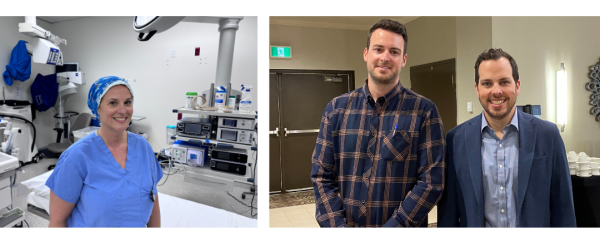New registered nurse first assistant positions helping support surgical access and quality

Nova Scotia Health marks five-years since it welcomed registered nurse first assistants (RNFA) to operating rooms. In 2019, the RNFA pilot program began in the Eastern Zone at Cape Breton Regional Hospital as part of the Hip and Knee Action Plan.
Since then, several more RNFAs have been added to surgical teams at Colchester East Hants Health Centre, Cape Breton Regional Hospital, Glace Bay Community Hospital and St. Martha’s Regional Hospital, with recruitment underway for additional roles.
Registered nurse first assistants work with surgeons in scheduled and emergency surgeries to support needs such as tissue exposure, suturing, wound management and much more. They also work outside of the operating room to contribute to patient care which includes capturing health histories and completing assessments.
Working to their full scope can help support all surgical disciplines, providing more patient and family support. An assistant who is also a Perioperative Registered Nurse improves OR efficiency, creating better access and patient care.
Jeff Hardy began his career in 2010 as perioperative staff nurse and was one of the two nurses in the RNFA pilot.
“The RNFA pilot program has allowed me to expand my scope as a perioperative nurse. This enables me to assist our surgeons while providing core support to the rest of the surgical team,” said Hardy.
"Helping the team with room changeover, for example, contributes to operating room efficiency while optimizing care. Providing education and mentorship to perioperative staff and medical students helps to strengthen our team.
Ear, nose, and throat surgeon (otolaryngologist), Dr. Blair Williams, has worked closely with Hardy since the pilot began, and stresses the importance of RNFAs in the operating room.
“The value of the RNFA is their interchangeability, flexibility and comfort in the operating room,” said Williams. “They have dedicated training on how to anticipate the surgeon’s needs, how to suture, and how to facilitate other aspects of the case. This lets surgeons focus more on the detail of the surgery and not worry about access and exposure because they have an excellent assistant who has that training and experience to do it safely and effectively.”
Traditionally, family physicians or another surgeon would assist in surgeries, with some continuing to provide this valuable role in regional hospitals. With RNFAs joining the core surgical team, these providers can continue with their primary practice and care of their patients.
Sherri Smith, who began working as an RNFA at Colchester East Hants Health Centre in fall of 2020, enjoys the hands-on nature of being in the operating room and takes pride in helping increase operating room efficiencies.
“I always wanted to be hands-on and enjoy being in the operating room to be able to assist and see the results of surgery,” said Sherri. “We support in many ways, including suturing which then frees surgeons to write their orders, see patients earlier and be able to start their next case right away.”
Funding for new RNFA positions in Truro and Sydney was included as part of Nova Scotia Health’s strategy to improve access to surgical care and reduce wait times.
Photos of Sherri Smith, RNFA, at CEHHC (left), and Jeff Hardy, RNFA (middle) and Dr. Blair Williams (right) at CBRH.